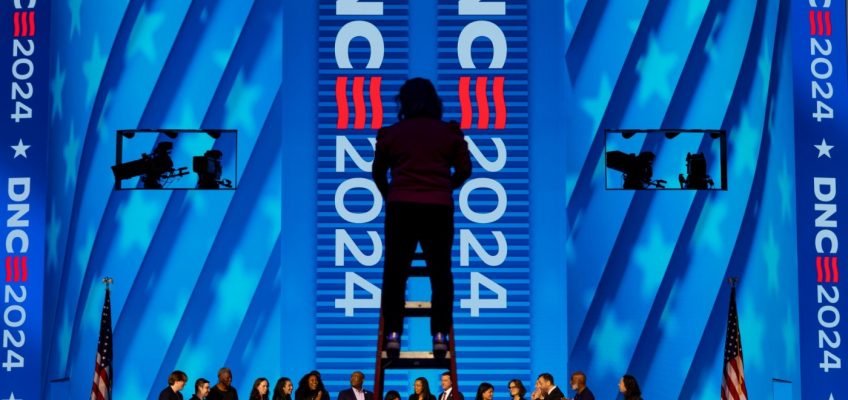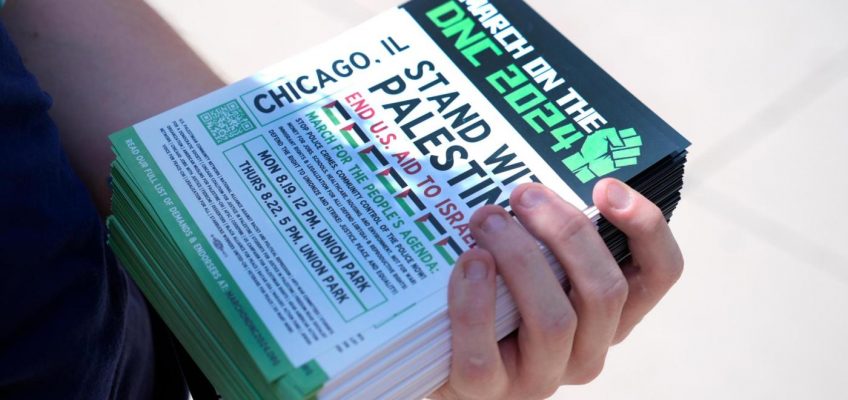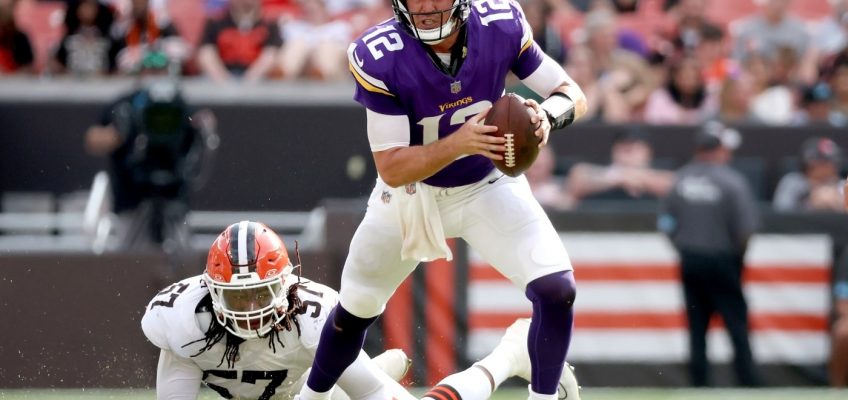The eyes of the political world turn to Chicago this week as tens of thousands of delegates, media, dignitaries and political influencers arrive for a historic Democratic National Convention featuring Vice President Kamala Harris’ celebratory and ceremonial acceptance of the party’s presidential nomination.
An event that only a month ago saw Democratic organizers trying to build enthusiasm over the anticipated renomination of President Joe Biden has now developed its own energy with the president’s decision to drop from the race and back Harris, the first Black and Asian woman to receive a major party nomination.
A convention that organizers had planned for more than a year to be a showcase of Biden accomplishments has been quickly rescripted to — starting Monday — define and boost Harris and her running mate, Minnesota Gov. Tim Walz, and offer voters an aggressive alternative in the Nov. 5 general election to former President Donald Trump and his running mate, U.S. Sen. JD Vance of Ohio.
Biden is scheduled to deliver the opening night keynote address. In doing so, he will in effect cede the presidential campaign stage to Harris while forcefully touting the new ticket and what’s at stake in the election. First Lady Jill Biden also is scheduled to speak on Monday and Harris, who is to fly into Chicago on Sunday night, is expected to be in attendance at the United Center.
As is traditionally the case at political conventions, the Democratic event will feature daily themes — “For the People” on Monday, “A Bold Vision For America’s Future” on Tuesday, “A Fight for Our Freedoms” on Wednesday and “For Our Future” on Thursday. The themes will be used to promote their speakers, including former Presidents Barack Obama and Bill Clinton as well as the Harris-Walz ticket. But there also is one overarching convention theme of parochial importance that also has national implications.
Does Chicago have something to prove with this convention?
There’s a chip on the City of Big Shoulders, like it or not, due to a national narrative that points to Chicago’s long-standing issues of crime and renewed questions of public safety.
A Google search on Chicago, while offering a litany of places to see, things to do and food to eat, also lists frequently asked questions such as, “Is Chicago worth visiting?” “What is the crime rate in Chicago” and “Is it safe to visit Chicago?”
They’re prompted by a narrative exploited and exaggerated amid the nation’s sharply divided politics — mainly through Republican attacks on a city run by Democratic progressives and led by a rookie mayor in Brandon Johnson.
And they’re driven by Trump who, throughout his political history, labeled the city “worse than Afghanistan,” “totally out of control” and a “total disaster,” despite having a lavish namesake hotel operation on the Chicago River.
Of course, no Democratic delegates are being housed there.
A tour boat prepares to pass under the Wells Street Bridge along the Chicago River on July 23, 2024. (Antonio Perez/Chicago Tribune)
At a convention kickoff luncheon on Saturday to thank those who helped bring the event to the city, Gov. JB Pritzker said picking Chicago as the location for the DNC was a calculated decision by Biden.
“There’s one really, really, important reason that he chose Chicago, and that is that we’ve demonstrated to the country that Democrats deliver in Chicago and in the state of Illinois,” Pritzker said, citing the convention theme of Illinois Democrats.
“So when all these people come from around the country, they get to see what the Democratic agenda looks like in action,” Pritzker said. “It is going to be one of the greatest experiences and the best conventions ever in the history of the Democratic Party.”
By the numbers, the 50,000 anticipated attendees are no big deal for a city that has long been a convention destination.
The annual Lollapalooza music festival, which wrapped up earlier this month, routinely draws 100,000 people per day. The annual National Restaurant Association show — the other NRA — draws more people in May. And in only three weeks the International Manufacturing Technology Show at McCormick Place will draw an estimated 100,000 visitors.
But for those events, there’s no need for specially designated security areas, protests are not part of the daily rituals and there are no dignitaries designated for protection by the U.S. Secret Service.
So the question of whether Chicago has something to prove can draw some defensive reactions when posed to convention advocates who live in the city.
“Do we have something to prove? Absolutely not. We know who we are. I know who these officers are. I know what this department is and who this department is,” said Chicago police Superintendent Larry Snelling.
“What I will tell you is, whatever the national narrative is, if it’s negative, we’ll prove that wrong. We’re not setting out to prove it wrong,” Snelling said. “The only thing that we do is what we do every single day — we go out here. We work to keep this city safe, and the DNC is no different.”
Superintendent Larry Snelling, right, attends a news conference to discuss final preparations for public safety before the Democratic National Convention at the Office of Emergency Management and Communications on Aug. 13, 2024, in Chicago. (Armando L. Sanchez/Chicago Tribune)
Chicago saw spikes in gun violence and other crime when the pandemic swept through the country in 2020, as well as in the aftermath of the killing that year of George Floyd by a police officer in Minnesota. Since then, the city has seen reductions by more than 20% each in killings and total shootings while the trend has gone in the opposite direction for other crimes such as robbery and sexual assault.
Chicago typically leads the nation each year in total slayings, but its homicide rate on a per-capita basis is far from being tops in the U.S.
Michael Jacobson, who heads the Illinois Hotel & Lodging Association, said that “tens of thousands of political thought leaders” will be in Chicago after having helped shape a narrative about a city “many of them haven’t been to … in a decade.”
“We do have something to prove in terms of redefining, reshaping that narrative about what Chicago is. If things go off without a hitch — and we’re confident that it will — we are going to successfully change a lot of people’s perceptions about Chicago. And then they’re going to go home and talk about it. They’re going to post on social media. You’re going to see stories written that Chicago is not what you thought it was. And so, yes, I do think we have something to prove,” Jacobson said.
“Do we have problems that need to be addressed? Absolutely. I’m not trying to sugarcoat the fact that we have some problems that we need to continue focusing on,” he added. “But at the end of the day, I think we do get a bad deal in terms of the fact that a lot of other major cities are going through very similar issues that Chicago is, and yet we get a lot worse narrative around this city than a lot of these other cities do.”
Red, white and blue balloons are bundled before being raised to the rafters on Aug. 15, 2024, inside the Democratic National Convention at the United Center. (Brian Cassella/Chicago Tribune)
Jacobson said there is a “new excitement” about the convention with the dramatic change to the Democratic ticket and said the city has seen an uptick in hotel bookings “that definitely coincides” with it.
Related Articles
Walz fundraiser violates separation of church and state, says incoming Archbishop of Boston
Walz touts Nebraska roots in visit to his home state where there’s a battle over one electoral vote
Trump zigzags between economic remarks and personal insults at rally in critical Pennsylvania
2024 election: What do Minnesotans think about Walz’s national spotlight?
As VP candidate, Gov. Tim Walz is getting national attention. So is Minnesota.
Still, there’s been no shortage of attempts to try to deflate expectations for the convention, including some often wild attempts to compare this year to the most infamous Democratic political convention in history, the violent DNC in Chicago in 1968. Much less attention has been paid to the last DNC in Chicago, the 1996 renomination of Clinton for a second term, which largely went off without a hitch.
One Chicago-based dark-money, Republican-aligned group has even posted a video series warning “how likely the city is to see a repeat of 1968.”
While 1968 was the last time a Democratic incumbent president, Lyndon B. Johnson, opted not to seek reelection and was replaced on the ticket by his vice president, Hubert Humphrey, the atmospherics then were very different from now.
LBJ stepped down after leading a vastly unpopular war in Vietnam amid nationwide protests from many, including military draft-eligible youths. It also was a year of violent political upheaval with the assassinations of civil rights leader the Rev. Martin Luther King Jr. and Robert F. Kennedy, who was pursuing the Democratic presidential nomination.
The 1968 convention was the ignition, if not a symbolic capstone, to a combustible decade of racial and antiwar strife. There was chaos inside the convention hall. There was chaos outside the convention hall.
“I know there are people who want to harken back to 1968. This is nothing like 1968,” Pritzker said recently. “We know how to manage through allowing protesters to exercise their First Amendment rights and have a great convention for the 50,000 people who are coming to Chicago.”
[]Protests are expected, led by Palestinian supporters lashing out at the violence and deaths in Gaza and the U.S. relationship with Israel in its war on Hamas. Chicago also has been coping with an influx of border immigrants bused from Texas by Republican Gov. Greg Abbott, though previous predictions from city leaders that tens of thousands of migrants would arrive here ahead of the DNC have so far not been proven out.
Protesters also plan to demonstrate during the convention in support of more affordable housing, better education opportunities, improvements on immigration, health care, policing, LGBTQ+ rights and development in long-neglected communities.
But there are protesters and there are disruptors.
It’s likely Chicago will see a combination of both throughout the city — not just in designated protest areas — and the response will say much about the image of the city and its leadership going forward.
It’s also the nature of political conventions to feature the contradiction of street protests and exclusive high-end parties.
Several groups, delegations and caucuses are planning to make use of places such as the House of Blues and Harry Caray’s to host parties.
With the Cubs out of town, Wrigley Field is expected to see two events, one co-hosted by Illinois Sens. Dick Durbin and Tammy Duckworth, and another by Harris’ presidential campaign.
On Tuesday night, when Pritzker is set to take the stage at the DNC as host governor, he later will be throwing a post-convention concert at the Salt Shed featuring John Legend, who disappointed some Ravinia-goers last year by appearing solo and largely talking about his own greatness rather than performing.
Gov. JB Pritzker greets people while visiting the stage before the Democratic National Convention Aug. 16, 2024, at the United Center. (Brian Cassella/Chicago Tribune)
Sam Toia, president of the Illinois Restaurant Association, said he also thinks Chicago has been unfairly singled out for criticism involving urban problems and issues.
“I just think it’s always good that we can show the country how good we are because sometimes the narrative is not good and it hasn’t ever been since the pandemic,” Toia said. “That’s not just the problem in Chicago. That’s in any big urban city.”
Toia said he expects Chicago restaurants to fare better than those in Milwaukee did for the Republican convention because the Wisconsin city’s footprint is so much smaller and falls within the security restricted areas. Food destinations in the West Loop, River North and much of the city aren’t encumbered by the restrictions.
Among Illinois’ top Democrats, there’s no shortage of boosterism for an event that Chicago business and political leaders think can provide a significant injection of cash and publicity into a city still struggling to regain its pre-COVID activity. Supporters say the convention could provide a $150 million boost to the city’s economy, though such estimates are often difficult to prove.
Still, Illinois Comptroller Susana Mendoza said she thinks the convention’s messaging to promote the Harris-Walz ticket and contrast it with Trump and Vance can also help turn the city’s narrative.
“I certainly think that having a president who, you know, puts down our city every five minutes certainly doesn’t help,” Mendoza said of Trump.
“I’m very proud of the beautiful city that we’re going to be presenting to people from across America,” she said. “And I think they can make up their own minds.”
Tribune reporter Olivia Olander contributed.




